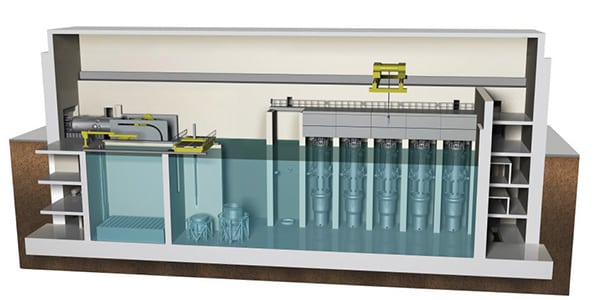New Milestone Reached in NuScale’s Push to License Small Modular Reactor
NuScale Power has completed its second submittal to the Canadian Nuclear Safety Commission (CNSC) for pre-licensing Vendor Design Review (VDR) of its small modular reactor (SMR).
A pre-licensing VDR is an optional service provided by the CNSC when requested by a supplier. It provides a mechanism that enables CNSC staff to provide feedback early in the design process. It is done prior to the submission of a license application to verify, at a high level, the acceptability of a nuclear power plant design with respect to Canadian nuclear regulatory requirements and expectations, as well as Canadian codes and standards. The review can also help identify fundamental barriers to licensing and ensures that a resolution path exists for any design issues identified. The pre-licensing VDR presumably makes the licensing process go more smoothly, if a license application is ultimately submitted by a vendor.
“Completion of the Vendor Design Review provides assurance to both the regulator and potential customers that the NuScale design will be acceptable to build and operate in Canada,” said NuScale Vice President of Regulatory Affairs Tom Bergman.
NuScale said it has signed an agreement with Bruce Power to develop a business case to support NuScale’s desire to bring its SMR technology to Canada. Ontario Power Generation (OPG) also participates on the NuScale Advisory Board and provides advice on potential deployment of NuScale technology in Canada.
Other SMR Designs Also Making Progress
On June 16, POWER reported that OPG was taking an ownership stake in an SMR project being developed by Seattle, Washington-based Ultra Safe Nuclear Corp. (USNC). The two companies formed a joint venture to build, own, and operate a proposed Micro Modular Reactor (MMR) demonstration at the Chalk River Laboratories site in Ontario.
USNC’s MMR is a 5-MWe (15-MWth) high-temperature gas-cooled reactor design. Mark Mitchell, president of USNC, in an interview with POWER late last year said, “What you get is dispatchable power that looks like a fossil fuel option, without any of the hassle of logistics of fuel procurement, and without any of the risks that people typically associate with nuclear power.” Not only does that inherent flexibility give nuclear a new role as a distributed, combined heat and power generator, but it also opens up new markets, including for remote off-grid applications, as well as in burgeoning power-hungry regions that have been hesitant to take on the complexities of new nuclear builds, such as in Africa, Mitchell said.
A Mature SMR Design
NuScale’s SMR design is larger than USNC’s, but still small compared to the 1-GW-plus reactors being constructed around the world today, such as the AP1000 and EPR designs. Each NuScale power module has a gross capacity of 60 MWe (200 MWth). Up to 12 modules can be combined into a multi-module configuration (Figure 1). Each module operates independently, while being monitored and controlled from a single control room. The modules are designed to be built and assembled in a factory, then shipped to a prepared site for easy deployment.

“NuScale is excited about the opportunities in Canada for our SMR technology, and we continue to make significant market entry progress,” NuScale Chairman and CEO John Hopkins said. “As NuScale prepares to deliver the U.S.’s first SMR power plant, we are pleased to simultaneously advance our work to bring the benefits of our safe, reliable, and operationally-flexible nuclear power plant to meet Canada’s diverse energy needs. Working with our majority owner Fluor, NuScale has developed an extensive supply chain in Canada through which it can serve customers in Canada and around the globe.”
Despite the COVID-19 pandemic, NuScale said its Regulatory Affairs team and the CNSC continue to move the pre-licensing VDR process forward on schedule. The VDR is to be completed in four submittals. The first submittal occurred on Dec. 10, 2019. The company noted that because its SMR design is “mature” it can directly enter VDR Phase 2.
—Aaron Larson is POWER’s executive editor (@AaronL_Power, @POWERmagazine).